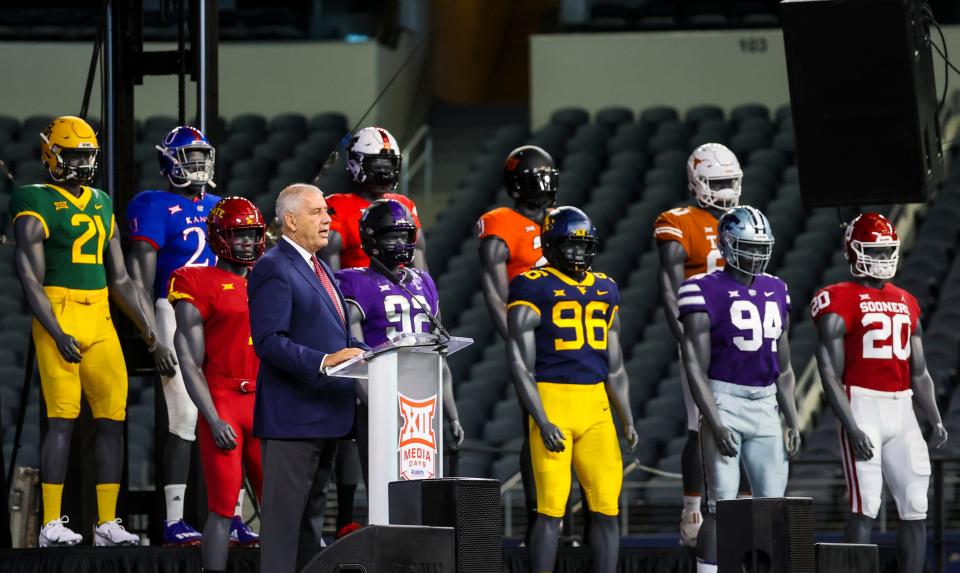Opinion: If college football players skip vaccine and COVID wrecks their season, it's their own damn fault
The problem was foreseeable as far back as late spring, when college football programs started promoting the COVID-19 vaccine, trying to unwind the myths and misinformation many players were getting from their peers, their families or social media.
As they found out over the last few months, it wasn’t so easy for the truth about the benefits of getting vaccinated to prevail, leaving dozens of programs with less than 50 percent of their roster protected as the summer dragged on.
But now, the urgency for college football programs to get as many players vaccinated as possible has come back to the forefront of the preseason discussion — not just as a matter of health and safety, but because it looms as a possible competitive advantage during the 2021 season.
“I wasn't excited about revisiting protocols for this fall,” commissioner Bob Bowlsby told reporters Wednesday at Big 12 media day. “And yet I think if you’re honest with oneself, you have to look at this and say, yeah we wish we were done with it but we're probably not quite done with it.”

'Horns Down'?: Taunt to Texas football players this season 'probably' a penalty
Not great!: COVID-19 cases surge to six-month high in Tokyo a week before Olympics
'It's possible, folks': Rich Eisen has COVID-19 despite being vaccinated
The implication of Bowlsby’s comments will be felt across every conference as the season ramps up. The prevalence of the Delta Variant, combined with the relatively low vaccination rates on some teams, significantly increases the odds that COVID-19 will disrupt the season to some degree.
That will almost certainly mean teams are forced to play games without key players due to either positive tests or contact-tracing issues, but in a more severe scenario, it could also mean a team has to forfeit because it doesn't have enough players available in a particular week. But unlike in 2020, college athletics officials have been adamant that there won’t be any room on the schedule this fall to make up or reschedule games.
Thus, the message to teams is simple: If a COVID-19 outbreak screws up your season, it’s your own damn fault.
“Frankly, anyone not getting vaccinated is taking unnecessary and unwarranted risks,” Bowlsby said.
At this point, though, telling an unvaccinated player that he's risking his health no longer resonates. The only thing that will get through is the notion that they could be putting their team at a disadvantage because of protocols that are likely to be far more stringent for the unvaccinated than the vaccinated.
It should be no surprise -- according to a person with knowledge of the matter who spoke on the condition of anonymity because of the sensitivity of the topic -- that Alabama is one of the few teams in the SEC that has passed the 85-percent vaccinated threshold that will allow it to avoid regular testing and other safety protocols.
Did you really think Nick Saban was going to risk having key players miss games because they didn’t get a vaccine? Of course not.
But not everybody in college football is as savvy or has as much control over his locker room as Saban, and it would be fair to say that the vaccination rates through most of this summer have been shockingly low — with some teams, according to administrators USA TODAY Sports has spoken with, hovering around 50 percent.
One of the more interesting trends, according to those administrators, is that sports besides football have not had a particularly tough time getting the vast majority of their athletes vaccinated.
As camp approaches, the expectation is that more athletes will get on board once they have a full understanding that vaccination means they don’t have to test regularly and are exempt from contact-tracing protocols. Administrators have also seen some evidence that players have been motivated to get vaccinated because of incidents like the N.C. State baseball team being disqualified from the College World Series — an outbreak that started with unvaccinated players.
Oklahoma coach Lincoln Riley told reporters that there was an uptick in vaccinations after Jon Rahm was disqualified from the Memorial tournament, where he had a six-stroke lead. One athletics director, whose football team was right around 50-percent vaccinated, told USA TODAY Sports that they were trying to motivate players by pointing out multiple schools in their conference were requiring vaccination for all students.
“That means those schools have an advantage over us if we don’t voluntarily get the vaccine at 100-percent level,” the administrator said.
Regardless of your political views on promoting or requiring vaccines, the percentage of players who get it will end up being a referendum on locker-room culture. COVID-19 won’t be a big issue this season for teams with strong internal leadership and a commitment to winning. Teams with selfish players who aren’t buying into the concept that it helps the team for them to get vaccinated will end up learning hard lessons.
As one Power Five assistant coach quipped: “If drug companies offered (name, image and likeness) packages, college football might reach 100 percent.”
Unfortunately, there won’t be any financial incentives to get players vaccinated. The threat of unnecessarily missing games — and causing teammates to miss games — is going to have to be enough.
This article originally appeared on USA TODAY: College football players who skip COVID vaccine risk wrecking teams

